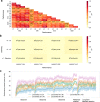Initial motor skill performance predicts future performance, but not learning
- PMID: 37443195
- PMCID: PMC10344907
- DOI: 10.1038/s41598-023-38231-5
Initial motor skill performance predicts future performance, but not learning
Abstract
People show vast variability in skill performance and learning. What determines a person's individual performance and learning ability? In this study we explored the possibility to predict participants' future performance and learning, based on their behavior during initial skill acquisition. We recruited a large online multi-session sample of participants performing a sequential tapping skill learning task. We used machine learning to predict future performance and learning from raw data acquired during initial skill acquisition, and from engineered features calculated from the raw data. Strong correlations were observed between initial and final performance, and individual learning was not predicted. While canonical experimental tasks developed and selected to detect average effects may constrain insights regarding individual variability, development of novel tasks may shed light on the underlying mechanism of individual skill learning, relevant for real-life scenarios.
© 2023. The Author(s).
Conflict of interest statement
The authors declare no competing interests.
Figures



References
-
- Johnson BP, Dayan E, Censor N, Cohen LG. Crowdsourcing in Cognitive and Systems Neuroscience. Neurosci. 2021;28:425–437. - PubMed
Publication types
MeSH terms
LinkOut - more resources
Full Text Sources

